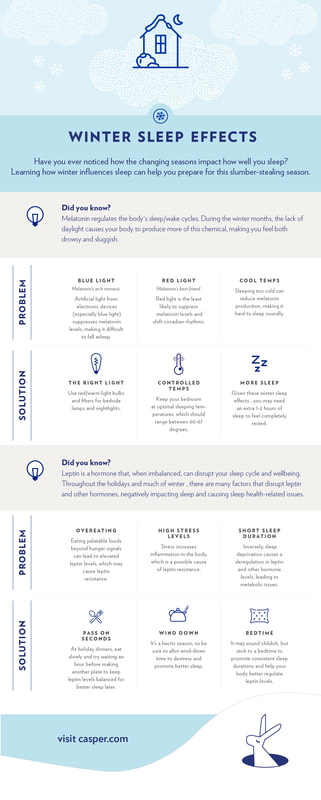|
The changing of seasons brings different discomforts to our sleep. It is important to our health and wellbeing that we stay mindful about which behaviors may impact our sleep and identify the ways we can cope with the changes in mood, weather, and time of year. Although there are countless things that can positively or negatively change the way we rest, during the winter season there are 3 common culprits to be most weary of. 1. Melatonin: Melatonin regulates the body's sleep / wake cycles. The lack of daylight can cause the body to produce more of the chemical in turn making the body feel drowsy and sluggish. Blue light can be considered melatonin’s arch nemesis. Studies have shown that blue light emitted by screens (TV, computer, phone etc.) suppresses melatonin levels making it more difficult to fall asleep. On the other hand, Red light would be considered melatonin’s best friend. Red light is the least likely to suppress melatonin levels and shift circadian rhythms. Consider red light options for bedside lamps and night lights. Do you live where it’s frigid? When the air is too cold, it will negatively affect melatonin production and cause the body's sleep cycle to be disrupted leaving you with an inadequate amount of rest. 2. Leptin: Throughout the holidays and much of the winter (hibernation) season, festive celebrations often feature sugary, fat-laden and high-calorie foods. These types of treats especially in an influx can significantly alter the body's hormone levels (specifically associated with metabolism and appetite). Most commonly, the hormone Leptin is impacted by eating too much of these types of foods in short sprints. The change in the levels of leptin in the body will disrupt our sleep cycles, while further altering our other hormones, often leading to sleep apnea or other health related discomforts. As with all hormone issues, Leptin resistance is a complex issue with no singular cause, but there are many winter related factors that can amplify and negatively impact Leptin levels. 3. Vitamin D: The body produces its own Vitamin D, in response to exposure to sunlight. For this reason, Vitamin D isn’t actually considered a vitamin at all, but rather classified as a hormone. Besides from the sun, people also receive Vitamin D through the right foods and dietary supplements. A Vitamin D deficiency is not just an excuse to take a tropical vacation. Since there is less sunlight in the winter, you may actually need an extra 1-2 hours of sleep to feel completely rested. Vitamin D deficient individuals experience less sleep overall and also more disrupted sleep cycles. Sleep is undoubtedly important, and although we can’t control the seasons we can control what we sleep on. If you find yourself facing sleep discomforts, start by examining your bedtime essentials and replace aged or overused items. For the new innovation in sleep comfort, consider mattresses with hybrid foam construction and an open cell design - not only will this offer balanced support for spinal alignment but also help you to sleep cool.
~guest writer Kelly Nicolli |
AuthorsRebecca M H Kitzerow is a Licensed Acupuncturist practicing in La Center, Washington. With over a decade of experience she has won 10 Nattie consumer choice awards from Natural Awakenings Magazine since 2014. Archives
July 2024
Categories
All
|
Photos from Hey Paul Studios, BeGreen_Studio, Pawel Pacholec, 1950sUnlimited, toulupaliaqaz, Joelk75, OnTask, Robert Gourley, cnu_sports, Mitya Ku, wuestenigel (CC BY 2.0), FootMassagez, 401(K) 2013, Mariana Heinz, @EdwardTerry, fishhawk, liverpoolhls, torbakhopper, Boemski, dolomitibl, Driscolltheque, Dave n Laura, Vaping360, MVWorks, Life Mental Health, MVWorks, mikefats, Scot Nelson, jfl1066, wZa HK, ruurmo, Guadalupe Cervilla, Army Medicine, GViciano, torbakhopper, adrigu, Saulo Cruz, Ben Cumming, marniejoyce, kcxd, JasonCorey, kanenas.net, Live to Create Photography, gm.esthermax, Unique Hotels Group, Zenspa1, mysiana, Tobias Lindman, Leader Nancy Pelosi, Kristoffer Trolle, swanksalot, Bill Selak, Parker Knight, stimpsonjake, Gedankensprudler, SuperFantastic, tonynetone, marniejoyce, JeepersMedia, Illusive Photography, 'Ajnagraphy', Iban Torras, scotted400, gtall1, dvanzuijlekom, BPPrice, Skley, torbakhopper, Renato Ganoza, anka.albrecht, QUOI Media, Public Domain Photos, Instant Vantage, Victor Tongdee, Free Grunge Textures - www.freestock.ca, sportEX journals, Nadja Tatar, angela n., marniejoyce, MVWorks, Karolina Kabat, Thomas Fisher Rare Book Library, UofT, ginnerobot, tracilawson, haven't the slightest, My Photo Journeys, Pierre Willemin, Florena_Presse, SuperFantastic, colindunn, zzkt, TraumaAndDissociation, ER24 EMS (Pty) Ltd., shixart1985 (CC BY 2.0), marniejoyce, Tomás Fano, freestock.ca ♡ dare to share beauty, Archives New Zealand, Jaykhuang, airdrie.m, Go-tea 郭天, OnTask, wuestenigel, focusonmore.com, Disney | ABC Television Group, Andrew Gustar, Didriks, ConstructionDealMkting, charlywkarl, barnimages.com, Lel4nd, runwaypilates, michaelstephanfotografie, McLevn, TraumaAndDissociation, eLife - the journal, Lars Plougmann, wuestenigel, shixart1985, boviate, davis.steve32, kevin dooley, @the.photoguy (insta), frederic.gombert, Feathering the Nest, Victor Tondee, shixart1985, wuestenigel, Joe K Gage, kennethkonica

 RSS Feed
RSS Feed
